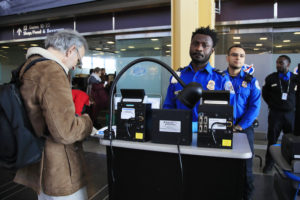The Cops Want This Car, Not That One
American police departments are using wish lists to decide which cars, electronics and other goods to seize in a practice that allows the government to confiscate property suspected of being tied to crime regardless of whether officers have secured a conviction or filed a charge.

At a seminar about civil asset forfeiture for local prosecutors and law enforcements officials in Santa Fe, N.M., Harry S. Connelly Jr., the city attorney of Las Cruces, laments the Mercedes that got away. Photo by The New York Times
American police departments are using wish lists to decide which cars, electronics and other goods to seize in a practice that allows the government to confiscate property suspected of being tied to crime regardless of whether officers have secured a conviction or filed a charge.
Known as civil asset forfeiture, the practice was expanded during the war on drugs in the 1980s and “has become a staple of law enforcement agencies because it helps finance their work,” The New York Times reports. It’s difficult to tell the total value of the goods seized by state and local law enforcement agencies to date, but under a Justice Department program, the value grew from $407 million in 2001 to $4.3 billion in 2012.
The New York Times posted footage of a lawyer lecturing officers on how to seize property most effectively. The paper described the seminars like this:
The Institute for Justice [a public interest law firm that is waging a legal and public relations battle against civil forfeiture], which brought the videos to the attention of The Times, says they show how cynical the practice has become and how profit motives can outweigh public safety.
In the sessions, officials share tips on maximizing profits, defeating the objections of so-called “innocent owners” who were not present when the suspected offense occurred, and keeping the proceeds in the hands of law enforcement and out of general fund budgets. The Times reviewed three sessions, one in Santa Fe, N.M., that took place in September, one in New Jersey that was undated, and one in Georgia in September that was not videotaped.
Officials offered advice on dealing with skeptical judges, mocked Hispanics whose cars were seized, and made comments that, the Institute for Justice said, gave weight to the argument that civil forfeiture encourages decisions based on the value of the assets to be seized rather than public safety. In the Georgia session, the prosecutor leading the talk boasted that he had helped roll back a Republican-led effort to reform civil forfeiture in Georgia, where seized money has been used by the authorities, according to news reports, to pay for sports tickets, office parties, a home security system and a $90,000 sports car.
Lee McGrath, a lawyer for the Institute for Justice, was quoted by the Times as saying, “At the grass-roots level — cities, counties — they continue to be interested, perhaps increasingly so, in supplementing their budgets by engaging in the type of seizures that we’ve seen in Philadelphia and elsewhere.”
See footage of the seminars and read more here.
— Posted by Alexander Reed Kelly
With an uncertain future and a new administration casting doubt on press freedoms, the danger is clear: The truth is at risk.
Now is the time to give. Your tax-deductible support allows us to dig deeper, delivering fearless investigative reporting and analysis that exposes what’s really happening — without compromise.
Stand with our courageous journalists. Donate today to protect a free press, uphold democracy and unearth untold stories.









You need to be a supporter to comment.
There are currently no responses to this article.
Be the first to respond.